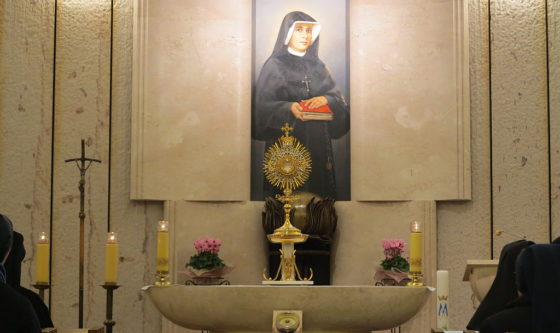Every school of spirituality refers in some way to the most life-giving sources of sanctification, the Holy Sacraments. Sister Faustina regarded all the sacraments, especially the Sacrament of Reconciliation and the Eucharist, as great gifts of Divine Mercy. Jesus Himself uncovered before her the magnitude of these gifts. “Tell souls – Jesus spoke about the Sacrament of Reconciliation – where they are to seek comfort, in the tribunal of My mercy; that’s where the greatest miracles happen all the time. To obtain such a miracle, you don’t have to go on a pilgrimage to a faraway place, neither do you have to perform any outward ceremonies, all you have to do is come to one of My representatives in a spirit of faith and tell him of your misery, and the miracle of Divine mercy will come about in all its fullness. Even should a soul be like a rotting carcass and even if to human eyes there should be no restoration and everything seemed to be utterly lost – for God it’s not like that, the miracle of Divine mercy raises up that soul completely. O, poor ones who do not make use of that miracle of Divine mercy” (Diary 1448).
Sister Faustina marvelled at merciful love of God present in every sacrament. The most she wrote about Jesus’ goodness who when departing from this world, wanted to remain with us and left Himself in the Sacrament of the Altar, opening ajar the door to His mercy. ”There is no wretchedness that could exhaust You – she exclaimed in delight – You have called all people to this fount of love, to this source of Divine mercy. Here is the abode of Your mercy, the remedy for our shortcomings. To You, O living spring of mercy, come all the souls – some, like deer thirsting for Your love; others to wash the wound of their sins; and still others, exhausted by life, to draw strength” (Diary 1747). The magnitude of this gift, wrote Sister Faustina, cannot be comprehended by any brain, human or angelic; that is why, we shall only get to know it fully in eternity. If the angels were capable of envy, she confessed in another Diary entry, they would envy people Holy Communion, in which God unites with His creatures most closely. He does not enter into such close union even with the angels (c.f. Diary 1804).
The awareness of the magnitude of this gift was the reason why there arose within her a spirit of profound gratitude and great respect towards such a humble Divine majesty; there also arose a feeling of great love for the One who had loved man to the end, and was ready to give up His own life for sinful man, becoming for him the Bread, which gives eternal life. She got to know the divinising power of the Eucharist and she knew how to make good use of it; that is why, her life became totally transformed both in her thinking and actions; to use the language of St. Paul, the old man within her had died, and the new man, modeled upon Christ, in whom all faculties were harmoniously united and focused on the supreme good, that is God, was. The manifestations of God’s mercy in the Eucharist, are particularly visible in those aspects which were experienced by Sister Faustina. The Eucharist was for her an area of her personal encounter with living God; it was a space of her co-sacrifice, in which she offered herself up together with Christ for the salvation of the world as well as of her close union with Him in the Holy Communion.
















